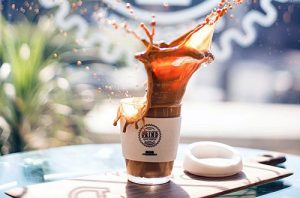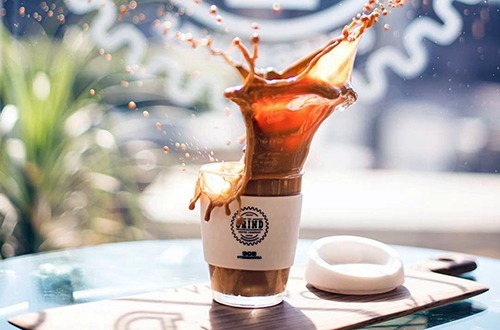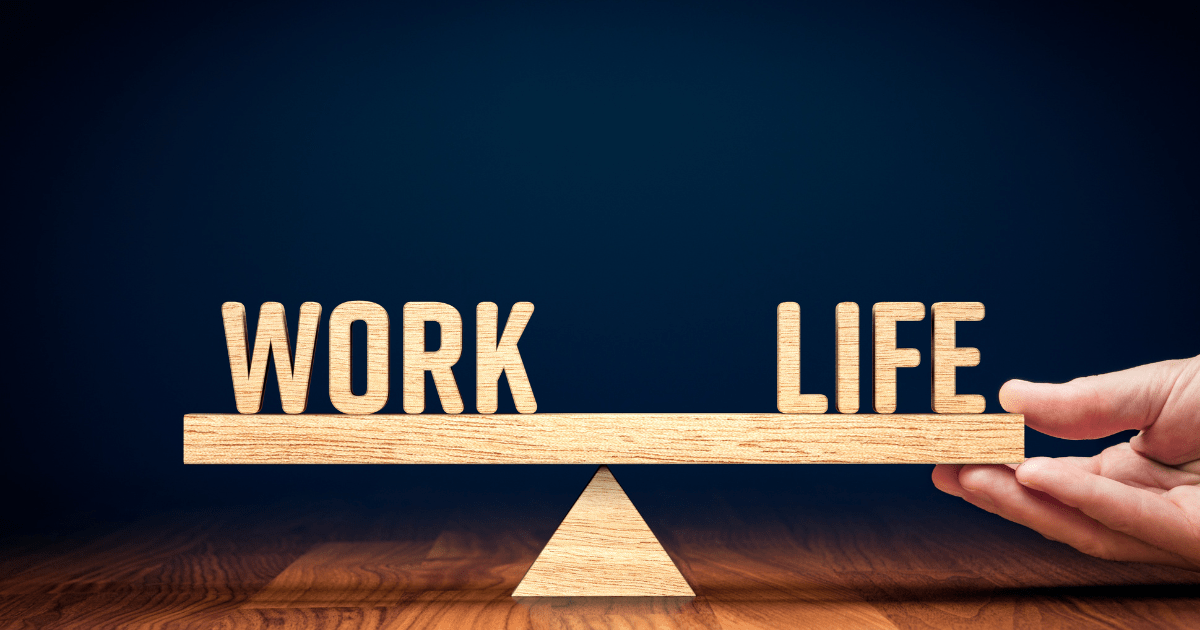
In a highly competitive industry, it’s not enough to only exist – to compete you must bring something different to the table and find innovative ways to stand out. This is what the founders of three up-and-coming SA coffee brands have achieved.
“With a commodity that’s the second most traded commodity in the world, I think we need to innovate quite aggressively,” says Dayne Levinrad, owner of The Grind Coffee Company and the brains behind the most ‘instagrammable’ coffee concept in the world – the Coffee In a Cone, which is cappuccino and espresso served in a chocolate coated ice-cream cone, available at their coffee shop located in Melrose Arch and various coffee shops in the Gauteng, Western Cape and Kwa-Zulu Natal provinces.
Levinrad was one of three coffee entrepreneurs featured at the recent Simodisa Startup Thursday discussing ‘The Business of Coffee’. The monthly event sees entrepreneurs, industry experts and investors gather to network and engage on issues within the entrepreneurship ecosystem.
Levinrad, together with two other coffee brand founders – Sebastian Schneider, co-founder of Motherland Coffee Company, a 100 percent African coffee brand, and Sihle Magubane, owner of the first 100 percent black-owned coffee company, Sihle’s Brew, gave insight into what it takes to survive in a competitive industry, how they handle cash flow issues and how they are building brands that can stand the test of time.
Getting Into Coffee
According to Schnieder, he ventured into coffee before the industry became as lucrative as it is now, and could from early on, already see its potential. He launched Motherland Coffee Company in 2009 together with his brother and sister-in-law, Rob and Kirstin Maud. The company serves coffee made strictly from beans sourced from Africa.
“We locally manufacture and export our product globally, we have expanded to six countries in the last six months – Dayne Levinrad (Coffee In a Cone)”
“At the time the industry wasn’t huge, there were not a lot of popular African coffee brands out there. Even African coffee [wasn’t popular], there were a lot of South American brands that were very popular.”
Today they have branches in Rosebank, Dunkeld West, Parktown, and St Georges Mall in Cape Town.
Magubane started out as a barista, obtaining his International Barista Skill Certificate, before launching his own coffee brand, Sihle’s Brew Roasting Coffee, a range of coffee beans sourced from Ethiopia, Kenya and Tanzania. The brand was so successful that he went on to open his own coffee shop, Sihle’s Brew Barista Love, located in Johannesburg in 2012. The coffee brand is also sold by various Food Lover’s Market retailers.
“I wanted to have a true South African company that will be the best coffee company in the world,” says Magubane.
Here are 5 lessons from these coffee innovators on what it takes to build a quality brand and their plans to take over the industry.
1. On Building An Iconic Brand
‘Get your culture right’ – “If I [had to choose] a personal claim to fame going forward, I would definitely like to be known for creating a great culture in the company. That I think to me would be something I could be really proud of” – Sebastian Schneider
‘100% South African’ – “Basically it’s creating a very unique South African brand that will be tried amongst other brands, and eventually it will be the best coffee [brand] in the world” – Sihle Magubane
‘Bringing Innovation to Coffee’ – “My claim to fame is probably Coffee In a Cone even though it wasn’t what I intended it to be. I think in the future I’d like to be known for innovation within the coffee space and with a commodity that’s the second most traded commodity in the world” – Dayne Levinrad
2. On Financial Rules They Live By
‘Sustainable growth’ – “Cash is a tricky thing. If you want to grow organically, it takes time. [It’s important to] have a big growth vision to partner with people who do not just put the money in, but also facilitate the platform for you to grow. It’s not an easy thing. The right partnerships and growth [is key]” – Sebastian Schneider
‘100% ownership’ – If you can manage cash flow, don’t ask for more investors. I know people are like, “what are you saying?”. In my company since I’ve [started] trading it’s 100 percent owned by myself because if I brought in investors they won’t understand my vision. I’ve refused R2.5 million for my company because I said these are the terms and conditions I want for my company to grow and if I sell my shares now, two to three years down the line the same company will be worth billions” – Sihle Magubane
‘My product is bigger than me’ – “I’d rather own one percent of a massive thing than a 100 percent of something very small. For me, I know my product is bigger than me, I know I don’t have all the tools to expand internationally so I need to rely heavily on people who have done it in the past, while I’m still growing and learning” – Dayne Levinrad
3. On Nailing Their Target Market
‘Our culture helped us find our market’ – “I guess the coffee market for any espresso-based speciality company is always the same. We started out thinking more about the kind of personality we want to create for the business, and [believed that] the people will find us, but very much in that specialty coffee arena” – Sebastian Schneider
‘Go where your market is’ – “You first look at the geographic area and look at how many coffee shops are there in that area. If there are no coffee shops, don’t put your coffee shop there. You’re not going to make it. You must have competition, it’s healthy. Look at the people around, how many people are likely to buy your product and the age average. That will give you an idea of whether it’s viable to start the business” – Sihle Magubane
‘Digital did the job for us’ – “We were very fortunate with social media and analytical reporting, we can see who our demographic is. Our product is a very sexy product, people want to pose and take selfies with it, so we were clear where our target and demographic needed to be. In this day and age with social media, you don’t have to guess anymore. It’s very targeted” – Dayne Levinrad
4. On Growth and Expansion Plans
‘SA-focused’ – “For us it’s about [expanding in] South Africa, Johannesburg specifically. There’s no reason to look abroad when there are opportunities here. A lot of guys abroad are looking here, so look here before looking elsewhere” – Sebastian Schneider
‘We are franchising’ – “We’ve already spoken to FASA, which is the franchising association of South Africa in terms of franchising, so we are going to franchise our coffee shop. We have two sets of companies – Sihle’s Brew Barista Love and Sihle’s Brew Roasting Coffee. In terms of scaling abroad, we are negotiating with two companies in the U.S so they will buy our products and we will maintain our packaging in terms of marketing ourselves abroad” – Sihle Magubane
‘Building manufacturing capabilities’ – We have national distribution of the cone. We actually created a factory, so [we went] from at home manually making the cones to a factory employing 20 ladies to make these cones. We locally manufacture and export our product globally, we have expanded to six countries in the last six months so we launched into Hong Kong, Canada, Australia, Europe and the UK. That’s obviously been from the virality that the product (the Coffee In a Cone) picked up on” – Dayne Levinrad
5. On What Other Entrepreneurs Should Know
‘Share the load’ – “Persevere and if you can, share the load. For a lot of people there’s so much on you in those early days that if you share the load with someone, that can see you through those early years” – Sebastian Schneider
‘Quality, quality, quality’ – “For me, every person should have perseverance, be true to yourself, produce a quality product that will sell, and conduct yourself in a good manner on different media platforms” – Sihle Magubane
‘Have an outlet’ – “I think having an outlet is important, whether that’s screaming in a dark room in a fetal position. No, an outlet like a sport or a type of physical activity. Routine is very important too, have a specific routine that you do everyday. I’m terrible at it. I am working hard [at it], but routine is very important. Third thing is wake up before everyone else so you have more time in a day to perfect what you want to perfect in that industry” – Dayne Levinrad







